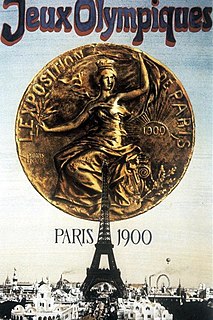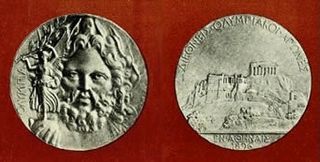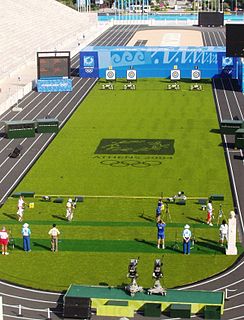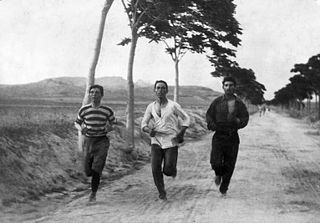Related Research Articles

The modern Olympic Games or Olympics are leading international sporting events featuring summer and winter sports competitions in which thousands of athletes from around the world participate in a variety of competitions. The Olympic Games are considered the world's foremost sports competition with more than 200 nations participating. The Olympic Games are normally held every four years, alternating between the Summer and Winter Olympics every two years in the four-year period.

The Summer Olympic Games, also known as the Games of the Olympiad, are a major international multi-sport event normally held once every four years. The Games were first held in 1896 in Athens, Greece, and were most recently the 2020 Summer Olympics held in 2021 in Tokyo, Japan. The International Olympic Committee (IOC) organises the Games and oversees the host city's preparations. In each Olympic event, gold medals are awarded for first place, silver medals are awarded for second place, and bronze medals are awarded for third place; this tradition began in 1904. The Winter Olympic Games were created out of the success of the Summer Olympics.

The 1900 Summer Olympics, today officially known as the Games of the II Olympiad and commonly known as Paris 1900, was an international multi-sport event that took place in Paris, France, in 1900. No opening or closing ceremonies were held. Competitions began on 14 May and ended on 28 October.

The 1900 Summer Olympics were held as part of the 1900 World's Fair, during which many cycling events were contested. The IOC website currently affirms a total of 3 medal events, after accepting, as it appears, the recommendation of Olympic historian Bill Mallon regarding events that should be considered "Olympic". These additional events include the men's points race. Thus, three cycling events are considered Olympic events. These three competitions were held between 9 September and 16 September 1900. The cycling part of the World's Fair included 250 competitors, 160 of them French. In the sprint and 25 km events, 72 competitors, all men, from seven nations competed.

Sailing/Yachting made its first appearance as an Olympic sport at the 1900 Summer Olympics after competitions were cancelled at the 1896 Olympics. With the exception of 1904, sailing was thereafter always a part of the Olympic program. The sailing program in 1900 consisted of a total of eight sailing classes. For six classes, the races were scheduled from 20 – 27 May at the river Seine around Meulan, and a series of three races was held for the largest classes from 1–5 August on the North Atlantic off the coast of Le Havre. Approximately 150 sailors in 64 boats from 6 nations competed, including 1 woman, Hélène de Pourtalès, who won a gold medal in the 1 to 2 ton.

An Olympic medal is awarded to successful competitors at one of the Olympic Games. There are three classes of medal to be won: gold, silver, and bronze, awarded to first, second, and third place, respectively. The granting of awards is laid out in detail in the Olympic protocols.

Olympic sports are contested in the Summer Olympic Games and Winter Olympic Games. The 2016 Summer Olympics included 28 sports, with five additional sports due to be added to the 2020 Summer Olympics program ; the 2014 Winter Olympics included seven sports. The number and types of events may change slightly from one Olympiad to another. Each Olympic sport is represented by an international governing body, namely an International Federation (IF). The International Olympic Committee (IOC) establishes a hierarchy of sports, disciplines, and events. According to this hierarchy, each Olympic sport can be subdivided into multiple disciplines, which are often mistaken as distinct sports. Examples include swimming and water polo, which are in fact disciplines of the sport of aquatics, and figure skating and speed skating, which are both disciplines of the sport of ice skating. In turn, disciplines are subdivided into events, for which Olympic medals are awarded. A sport or discipline is included in the Olympic program if the IOC determines it to be widely practiced around the world, that is, the popularity of a given sport or discipline is indicated by the number of countries that compete in it. The IOC's requirements also reflect participation in the Olympic Games – more stringent conditions are applied to men's sports/disciplines and to summer sports/disciplines.

Cycle sport is competitive physical activity using bicycles. There are several categories of bicycle racing including road bicycle racing, cyclo-cross, mountain bike racing, track cycling, BMX, and cycle speedway. Non-racing cycling sports include artistic cycling, cycle polo, freestyle BMX and mountain bike trials. The Union Cycliste Internationale (UCI) is the world governing body for cycling and international competitive cycling events. The International Human Powered Vehicle Association is the governing body for human-powered vehicles that imposes far fewer restrictions on their design than does the UCI. The UltraMarathon Cycling Association is the governing body for many ultra-distance cycling races.
The 1900 Summer Olympics were held in Paris, France, from May 14 to October 28, 1900, as part of the 1900 World's Fair.
At the 1908 Summer Olympics, three motorboat racing events were contested. Various sources refer to the sport as "water motorsports", "motor boats", and "power boating". The 1900 and 1908 Summer Games were the only ones to feature motorised sports. The IOC has never decided which events were "Olympic" and which were not.

The men's marathon was a track & field athletics event at the 1900 Summer Olympics in Paris. It was held on July 19, 1900. 13 athletes from five nations competed in the marathon, which used a distance of 40.26 kilometres.

The all-time medal table for all Olympic Games from 1896 to 2020, including Summer Olympic Games, Winter Olympic Games, and a combined total of both, is tabulated below. These Olympic medal counts do not include the 1906 Intercalated Games which are no longer recognized by the International Olympic Committee (IOC) as official Games. The IOC itself does not publish all-time tables, and publishes unofficial tables only per single Games. This table was thus compiled by adding up single entries from the IOC database.

Sailing has been one of the Olympic sports since the Games of the I Olympiad, held in Athens, Greece, in 1896. Despite being scheduled in the first Olympic program, the races were canceled due to severe weather conditions. Apart from the 1904 Summer Olympics, sailing has been present in every edition of the Olympic Games.
Pigeon racing was contested at the 1900 Olympic Games in Paris. It is known that there were seven events on the 1900 Olympic Games schedule. These events have generally not been classified as official, although the IOC has never decided which events were "Olympic" and which were not.
Motor racing was contested at the 1900 Summer Olympics. Fourteen events were held in conjunction with 1900 World's Fair. These events have generally not been classified as official, although the IOC has never decided which events were "Olympic" and which were not.
Boules was on the Summer Olympic Games programme in 1900. Boules events have generally not been classified as official, although the IOC has never decided which events were "Olympic" and which were not. As with the sport of croquet, generally regarded as "official", boules satisfied three of four retrospective criteria — restriction to amateurs, open to all nations, open to all competitors and without handicapping. As with croquet, there were only French players.
Kite flying was on the Summer Olympic Games programme in 1900. These events have generally not been classified as official, although the IOC has never decided which events were "Olympic" and which were not.

The marathon at the Summer Olympics is the only road running event held at the multi-sport event. The men's marathon has been present on the Olympic athletics programme since 1896. Nearly ninety years later, the women's event was added to the programme at the 1984 Olympics.

The rate of participation of women in the Olympic Games has been increasing since their first participation in 1900. Some sports are uniquely for women, others are contested by both sexes, while some older sports remain for men only. Studies of media coverage of the Olympics consistently show differences in the ways in which women and men are described and the ways in which their performances are discussed. The representation of women on the International Olympic Committee has run well behind the rate of female participation, and it continues to miss its target of a 20% minimum presence of women on their committee.
References
- 1 2 "Olympic Games medalists - other sports".
- ↑ Mallon, Bill (1998). The 1900 Olympic Games, Results for All Competitors in All Events, with Commentary. Jefferson, North Carolina: McFarland & Company, Inc. pp. 25–26. ISBN 978-0-7864-4064-1.
- ↑ Lennartz, Karl; Teutenberg, Walter (1995). Olympische Spiele 1900 in Paris. Kassel, Germany: Agon-Sportverlag. p. 147. ISBN 3-928562-20-7.
In many works, it is read that the IOC later met to decide which events were Olympic and which were not. This is not correct and no decision has ever been made. No discussion of this item can be found in the account of any Session.